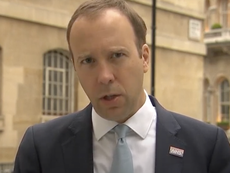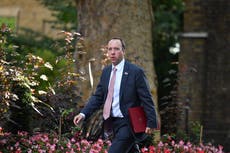UK lockdown: Government must explain justification for any new coronavirus measures, MPs say
Parliament’s Joint Committe on Human Rights says ‘confusion and disproportionality’ over fines and police enforcement must end
Your support helps us to tell the story
From reproductive rights to climate change to Big Tech, The Independent is on the ground when the story is developing. Whether it's investigating the financials of Elon Musk's pro-Trump PAC or producing our latest documentary, 'The A Word', which shines a light on the American women fighting for reproductive rights, we know how important it is to parse out the facts from the messaging.
At such a critical moment in US history, we need reporters on the ground. Your donation allows us to keep sending journalists to speak to both sides of the story.
The Independent is trusted by Americans across the entire political spectrum. And unlike many other quality news outlets, we choose not to lock Americans out of our reporting and analysis with paywalls. We believe quality journalism should be available to everyone, paid for by those who can afford it.
Your support makes all the difference.The government must be transparent about its reasons for any future coronavirus lockdowns and “justify” its interference with public freedoms, MPs have said.
The warning was issued by parliament’s Joint Committee on Human Rights as Boris Johnson considers new restrictions to curb a rapid rise in infections.
"The government must be transparent in justifying the timings of its decisions to go into, and out of, lockdown,” said a report released on Monday.
"Assessments of the proportionality of measures must be up-to-date, based on the latest scientific evidence, and formulated as a result of a precautionary approach to minimising overall loss to life.
“Importantly, the government must be transparent in justifying its decision-making, including in explaining how it has balanced competing interests and the evidence on which the balancing decision has been made."
MPs said that “confusion and disproportionality” in the police response to the pandemic must be stopped, and that the government had changed coronavirus laws once a week on average.
They raised concern about the disproportionate fining of black and Asian men for lockdown violations, and said: “The government must learn from these mistakes to ensure that any additional lockdowns do not unfairly impact specific groups”.
The health secretary refused on Sunday to rule out a second national lockdown and warned that Britain was at a “tipping point”.
With cases rising across the country, Matt Hancock said there was a danger the numbers could “shoot through the roof”.
He urged people to follow the new “rule of six” restrictions and social distancing measures, adding: “We of course have to be prepared to take action if that's what's necessary.”
The government has imposed several new local lockdowns and announced that anyone in England who refuses an order to self-isolate could face a fine of up to £10,000.
Harriet Harman, chair of the Joint Committee on Human Rights, said the scale of the coronavirus pandemic was “unlike anything many of us will see again in our lifetime”.
She said: “Disruption to our normal way of life and human rights are sometimes necessary in order to lead the country through any significant emergency, but this must always be done in a way that is proportionate and justifiable in accordance with the balancing act that is protecting our human rights.”
The committee said its report aimed to inform “any future response to a ‘second wave’ of the virus” as well as a six-month review of the Coronavirus Act 2020.
MPs found that restrictions on movement, gatherings, businesses, school closures and meeting loved ones had all impacted on human rights.
But the report said that because the government had acted to protect the overriding right to life, it had not violated international human rights laws.
The committee warned that the right also imposed obligations on the government to learn lessons and “avoid unnecessary deaths in the future”.
It called for a review to be carried out as soon as possible for immediate planning purposes, followed by a wider public inquiry.
MPs said it would be necessary to consider issues including deaths in care homes due to early releases from hospitals.
The report said any inquiry should also examine the deaths of health and social care workers, transport staff, police and security guards “due to inadequate PPE [personal protective equipment]”.
“In order to ensure respect for the right to life, it is crucial to ask whether the steps taken have done enough to protect the lives of those most vulnerable to the disease,” it added.
“The death rates for older people and those from black, Asian and ethnic minority (Bame) groups amongst others have been startlingly high in comparison to other groups.”
The committee said that Bame groups had also been disproportionately affected by the enforcement of lockdown laws, which may have been misapplied by police in some cases.
“There has been confusion over the status and interpretation of guidance, and the relationship between guidance and the law,” the report said. “Lessons must be learnt urgently from this period of lockdown in order to avoid the worst elements of confusion and disproportionality before any second wave and any further lockdowns either at a local or national level.
“This is all the more important given the speed and frequency with which national and local lockdown laws change and the consequent difficulty for people to keep on top of what is legally required and what is reasonably expected of them.”
The committee found that coronavirus legislation had changed once a week on average, and that it was not easy enough for people to access or understand current laws.
Police have handed out more than 19,000 fines under the Health Protection Regulations so far and MPs warned that unclear language and “confusion among police” meant that some may have been given out incorrectly.
They called for the government to introduce a formal way of challenging the penalties, which people must currently pay or face prosecution.
MPs criticised the government for continuing to use statutory instrument procedures, which bypass full parliamentary scrutiny, for creating coronavirus laws, and for making major announcements to the press before making them in parliament.
They said that emergency powers could be justified in March but must now be “limited to what is absolutely necessary”.
The report also raised concern about the treatment of people in prisons and other forms of detention, as well as access to justice amid court delays, and privacy issues around contact tracing.






Join our commenting forum
Join thought-provoking conversations, follow other Independent readers and see their replies
Comments